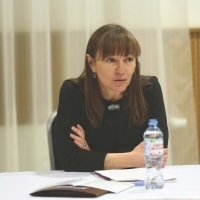Great Powers, Small Wars: Asymmetric Conflict since 1945
In a sophisticated combination of quantitative research and two in-depth case studies, Larisa Deriglazova surveys armed conflicts post–World War II in which one power is much stronger than the other. She then focuses on the experiences of British decolonization after World War II and the United States in the 2003 Iraq war. Great Powers, Small Wars employs several large databases to identify basic characteristics and variables of wars between enemies of disproportionate power. Case studies examine the economics, domestic politics, and international factors that ultimately shaped military events more than military capacity and strategy.
Overview
In a sophisticated combination of quantitative research and two in-depth case studies, Larisa Deriglazova surveys armed conflicts post–World War II in which one power is much stronger than the other. She then focuses on the experiences of British decolonization after World War II and the United States in the 2003 Iraq war. Great Powers, Small Wars employs several large databases to identify basic characteristics and variables of wars between enemies of disproportionate power. Case studies examine the economics, domestic politics, and international factors that ultimately shaped military events more than military capacity and strategy.
Speaker

Larisa Deriglazova
Professor, Department of World Politics; Head, Centre for European Studies; and Head, Master Degree Program on EU Studies, Tomsk State University, Russia
Hosted By

Kennan Institute
The Kennan Institute is the premier US center for advanced research on Russia and Eurasia and the oldest and largest regional program at the Woodrow Wilson International Center for Scholars. The Kennan Institute is committed to improving American understanding of Russia, Ukraine, Central Asia, the Caucasus, and the surrounding region though research and exchange. Read more

Cold War International History Project
The Cold War International History Project supports the full and prompt release of historical materials by governments on all sides of the Cold War. Through an award winning Digital Archive, the Project allows scholars, journalists, students, and the interested public to reassess the Cold War and its many contemporary legacies. It is part of the Wilson Center's History and Public Policy Program. Read more

Global Europe Program
The Global Europe Program is focused on Europe’s capabilities, and how it engages on critical global issues. We investigate European approaches to critical global issues. We examine Europe’s relations with Russia and Eurasia, China and the Indo-Pacific, the Middle East and Africa. Our initiatives include “Ukraine in Europe” – an examination of what it will take to make Ukraine’s European future a reality. But we also examine the role of NATO, the European Union and the OSCE, Europe’s energy security, transatlantic trade disputes, and challenges to democracy. The Global Europe Program’s staff, scholars-in-residence, and Global Fellows participate in seminars, policy study groups, and international conferences to provide analytical recommendations to policy makers and the media. Read more
Thank you for your interest in this event. Please send any feedback or questions to our Events staff.










